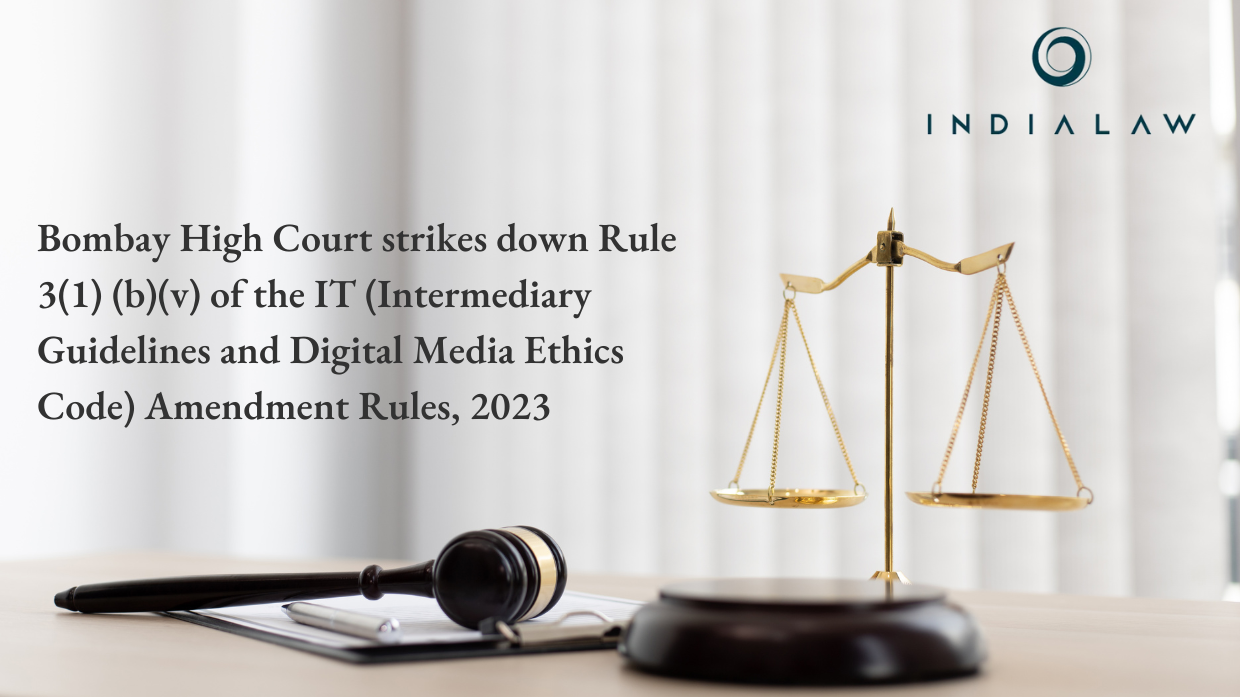Bombay High Court strikes down Rule 3(1) (b)(v) of the IT (Intermediary Guidelines and Digital Media Ethics Code) Amendment Rules, 2023 upholds free speech and the significance of due process

On April 6, 2023, the Ministry of Electronics and Information Technology issued a gazette notification introducing the Information Technology (Intermediary Guidelines and Digital Media Ethics Code) Amendment Rules, 2023 (IT Rules 2023). These rules required social media platforms—like Facebook, Twitter, and Instagram—to remove content deemed “fake, false, or misleading” by a government-established Fact-Checking Unit (FCU) concerning the “business of the Central Government.” The intent was to improve the accuracy of information shared on these platforms, especially regarding government news.
Kunal Kamra, a well-known political satirist, alongside other petitioners, challenged the validity of Rule 3(1)(b)(v) of the IT Rules 2023 in the Bombay High Court. They argued that the creation of the FCU violated Section 79 of the Information Technology Act, 2000, which protects social media platforms from liability for user-generated content.
The petitioners referenced the Supreme Court’s ruling in Shreya Singhal v. Union of India (2015), which stated that content removal orders must come from a court, asserting that the IT Rules 2023 allowed the government to bypass judicial oversight.
The division bench of the Bombay High Court, comprising Justices Gautam Patil and Dr. Neela Gokhale, issued a split verdict on the matter. To resolve the disagreement, a third judge, Justice AS Chandurkar, was called upon to provide an opinion.
In his opinion dated September 20, 2024, Justice Chandurkar held that the Information Technology Amendment Rules, 2023, which empowered the Centre to establish FCUs for identifying fake news online, contravened Articles 14 and 19 of the Constitution. He emphasized that the amendment was discriminatory, as there was no justifiable reason for treating information related to the business of the Central Government differently from other information. Consequently, the division bench ruled that the amended rules were unconstitutional and struck them down.
Justice Chandurkar supported Justice Patil’s view regarding principles of natural justice, highlighting that the absence of clear operational guidelines for the FCU deprived individuals of the opportunity to defend themselves against claims that their information was fake or misleading. This lack of due process, especially given the serious consequences of such determinations, rendered the rule invalid.
The court also found that Rule 3(1)(b)(v) imposed restrictions on the fundamental right to freedom of speech under Article 19(1)(a) that were not permissible under Article 19(2). The judge pointed out that information regarding the Central Government, when published in print media, faced no such scrutiny as when it appeared online. This inconsistency raised serious concerns about free speech.
Moreover, the court noted that the FCU would essentially be judging its own cases by determining what information was false or misleading, undermining impartiality. The argument that individuals could challenge the FCU’s decisions in court did not provide adequate safeguards against potential bias.
The judge also highlighted that the terms “fake,” “false,” and “misleading” were vague and lacked precise definitions. This ambiguity risked misapplication or misinterpretation of the rules, creating a chilling effect on free expression. The court emphasized that without clear guidelines, individuals could find themselves facing arbitrary censorship.
Finally, Justice Chandurkar opined that Rule 3(1)(b)(v) was ultra vires the Information Technology Act, 2000, because it was not presented to Parliament as required by law. The rule imposed restrictions that exceeded those allowed under the Constitution and lacked necessary safeguards.
In conclusion, the Bombay High Court’s decision to strike down Rule 3(1)(b)(v) reaffirms the protection of free speech and the significance of due process. By preventing arbitrary censorship, the ruling underscores the importance of clear guidelines and judicial oversight in content moderation. This judgment not only safeguards the rights of individuals but also reinforces the principle that all information, regardless of its source, deserves fair treatment under the law.
This case serves as a critical reminder of the delicate balance between regulating misinformation and protecting fundamental freedoms in the digital age. The court’s ruling sets a precedent that highlights the need for transparency and accountability in the government’s approach to managing information online, ensuring that democratic principles remain at the forefront of digital governance.
By entering the email address you agree to our Privacy Policy.



